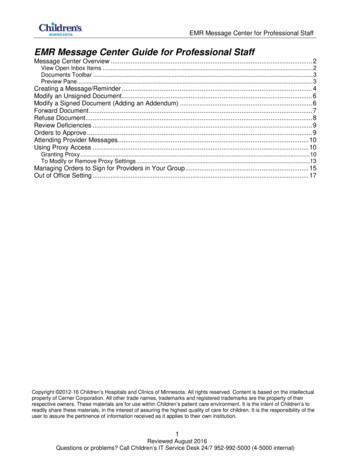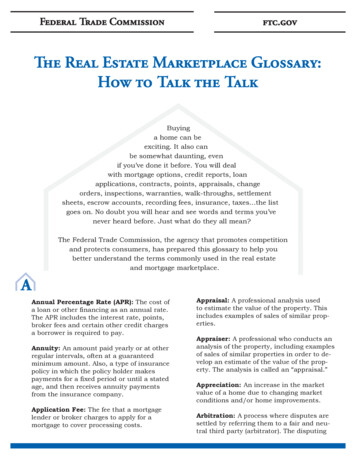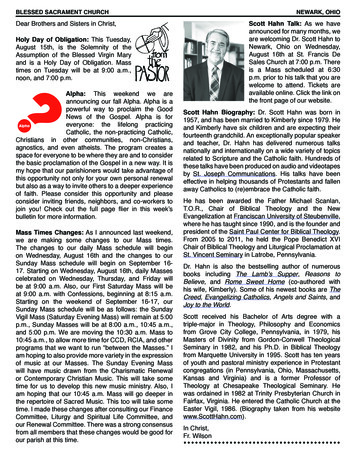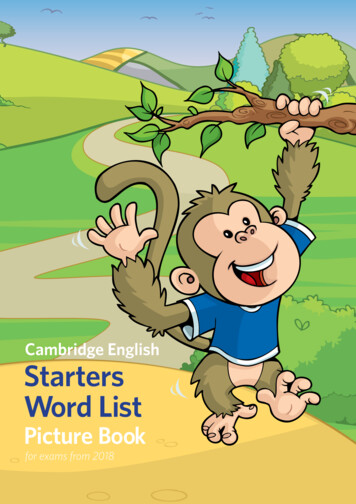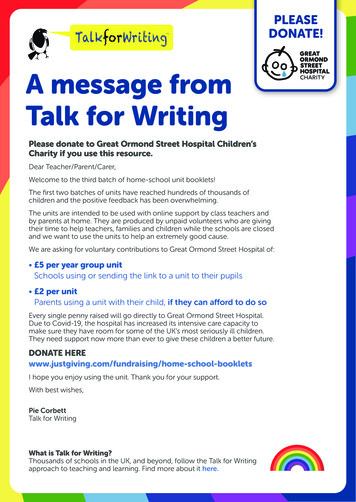
Transcription
PLEASEDONATE!A message fromTalk for WritingPlease donate to Great Ormond Street Hospital Children’sCharity if you use this resource.Dear Teacher/Parent/Carer,Welcome to the third batch of home-school unit booklets!The first two batches of units have reached hundreds of thousands ofchildren and the positive feedback has been overwhelming.The units are intended to be used with online support by class teachers andby parents at home. They are produced by unpaid volunteers who are givingtheir time to help teachers, families and children while the schools are closedand we want to use the units to help an extremely good cause.We are asking for voluntary contributions to Great Ormond Street Hospital of: 5 per year group unitSchools using or sending the link to a unit to their pupils 2 per unitParents using a unit with their child, if they can afford to do soEvery single penny raised will go directly to Great Ormond Street Hospital.Due to Covid-19, the hospital has increased its intensive care capacity tomake sure they have room for some of the UK’s most seriously ill children.They need support now more than ever to give these children a better future.DONATE kletsI hope you enjoy using the unit. Thank you for your support.With best wishes,Pie CorbettTalk for WritingWhat is Talk for Writing?Thousands of schools in the UK, and beyond, follow the Talk for Writingapproach to teaching and learning. Find more about it here.
1 Talk for Writing
2Welcome to the One Chance workbookInside you’ll find lots of things to work through thatwill help you with your reading and writing skills andbuild on the work you do at school.I’m your virtual teacher, so let's explore together andget your journey startedIntroduction“Be careful what you wish for,you may receive it.” – anonymousHave you ever thought about what this means?The underlying moral of the wishing tale is often played out in real life. Every weekmany people dream of winning the lottery – they make a wish. Someone then winsa huge sum of money. While this might seem like great news, the story often leadsto misery and unhappiness. The sudden win changes lives. Friends and family maybe lost. The ‘winner ’may lose a sense of purpose as they no longer have to go towork.This moral message is one that has been used many, many times in stories acrossthe world. It was first thought to have been used in Aesop’s Fables. Aesop was aslave and storyteller believed to have lived in ancient Greece.The aim of this workbook is to enjoy and explore wishing stories, leading to youhaving a go at writing your own version.Just one wishIf you had just one chance to make a wish, what would you wish for?Brainstorm some ideas. For example, I might wish for a new car, a dogor a yacht. Or to be a world-famous footballer or not to have to go toschool! Talk for Writing
3The downsideNow try and think about the positives and negatives of having thatwish granted.For example,I wish I had a bright red Ferrari. I could drive at immense speed and win many greatraces.However, I would be adding to the destruction of the planet, be breaking the speedlimit and endangering my life and the lives of others. .I wish I had a small, brown Dachshund. I could take it for long, leisurely walks in thecountryside.However, I would have to leave it alone for hours on end while I was at school. Now have a go yourself:I wish I I couldHowever,I wish I I couldHowever, Talk for Writing
4Now try to be a little more magical. Anything is possible! Forexample: I wish I was in Hogwarts and befriended Hermione. I couldlearn some magical spells, play Quidditch and soar high on my enchantedbroom.However, I might let them all know what happens in the story and ruin itfor everyone.I wishI couldHowever,I wishI couldHowever, Talk for Writing
5The Mirror of WishesDo you remember how, in Snow White, the wicked Queen used amirror that always told the truth? This poem is about what happenswhen different characters look into a mirror that shows what youwish for. Make a list of people who might look into the wishingmirror and think about what they would wish to see. Pie decided towrite about – a teacher, a sailor, a superhero, an astronaut, a pirate,a dragon hunter and a writer.As you can see, he has written each idea using the same pattern, based on twolines. Copy his pattern but use your own characters and ideas about what theymight wish for. Write your poem in your notebook.The Mirror of WishesThe teacher looked into the mirrorAnd saw a class of hard-working children.A sailor looked into the mirrorAnd saw the still waters of the Atlantic.Batman looked into the mirrorAnd saw a crime free day in Gotham City.An astronaut looked into the mirrorAnd saw his capsule landing in the sea.A pirate looked into the mirrorAnd saw where a treasure chest lay buried.A dragon hunter looked into the mirrorAnd saw the location of a dragon’s cave.A writer looked into the mirrorAnd saw stories waiting to be told. Pie Corbett 2020 Talk for Writing
6The Mirror of DespairOn the wall, there is also the mirror of despair! This always showswhat you fear most of all happening. Either make a new list of peoplewho might look into the mirror of despair and think about what theywould most fear to see or write about the same characters to find outwhat they might most fear. Once again, Pie has written each ideausing the same pattern.Try copying his pattern but use your own characters and ideas about what theymight most hate to have happen in their lives. Write your poem in yournotebook.The Mirror of DespairThe teacher looked into the mirrorAnd saw children throwing paper airplanes.A sailor looked into the mirrorAnd saw a tsunami approaching.Superman looked into the mirrorAnd saw he was wearing a pair of kryptonite tights!An astronaut looked into the mirrorAnd saw an asteroid as big as Bristol approachingA pirate looked into the mirrorAnd saw sharks gathering beneath the plank.A dragon hunter looked into the mirrorAnd saw that he had picked up a plastic sword by mistake.A writer looked into the mirrorAnd saw a library burst into flames. Pie Corbett 2020 Talk for Writing
7Now read or listen to this story:You can listen to it nce/s-A3SQppItbOxOne ChanceOutside, the evening was cold and wet. A squally wind howled, rattling the roof tilesand shaking the window frames of 13 Wager Road. Inside, shabby curtains weredrawn, a humble fire crackled and a couple sat in silence. Jack stretched out on thetired couch with an amused smile, turning the page of his favourite novel. Sarahscowled, silently seething. She scanned the room, noticing the worn-out furniture,peeling paint and, in her opinion, a pointless, idle husband. She deserved so muchmore than this.Suddenly, the letterbox jangled and there was a solitary but decisive knock on thedoor. Hope, the Labrador, barked. Sarah pulled back the curtain and watched as ahooded figure slipped silently away up the road. Puzzled, she stared down at a goldencard that had appeared, glinting on the frayed doormat.Tentatively, she gathered it up and read it out loud:Golden Lottery Ticket Ltd.Congratulations!You have been selected as one of our lucky lottery winners.This golden ticket entitles you to receive one of three exclusive wishes.Simply, scratch the card and make your wish.Once you have claimed your wish, pass on the luck!Wish 1RedeemedWish 2Scratch hereWish 3Scratch hereSmall print: Remember to use your precious wish wisely – wealth is not the root of happiness. Talk for Writing
8What next? We’ve stopped at an interesting part of the story. Summarise belowwhat you think could happen next.I predict Now let’s find out how close your predictions were. Read on!Sarah gasped. This is just what she was looking for – another chance. Maybe losethe idle husband as well, she thought, shaking her head.“I am going to give this a go. I am thinking lots of money to buy expensive clothesand maybe you can finally sort this house out,” she said to Jack, rummagingdesperately in the drawer for a coin.“Utter nonsense,” muttered Jack, glancing up from his book and taking in the room.“I love this old house and you just the way you are. Even if all that did come true,there’ll be a catch. No one gets something for nothing. Just throw it away.”Sarah stopped and nodded sullenly. He was right. She made to throw the ticket onthe fire, but something stopped her. Furtively, she stashed it in her pocket.Later that evening, as Jack slept, Sarah retrieved the ticket and greedily scratched‘Wish 2’, dreaming of immense riches or, to be precise, 100,000. Outside, a squallywind howled. Inside, nothing happened. Bitterly, she tossed the ticket into the bin.The next day, the wind died down to a cool, whispering breeze. Jack prepared forhis early morning walk with Hope. Pulling his woollen hat firmly down over his ears,he called out to Sarah that he wouldn’t be out long and left. Sarah scowled. Shecould barely respond. Talk for Writing
9Eight hours passed and Sarah began to worry – where were Jack and Hope? Shakingwith fear, she dialled 999, hoping for the best but fearing the worst.A massive search was launched but there was no sign. Jack and Hope had simplyvanished. Sarah was distraught. Deep down she worried if their disappearance hadanything to do the golden ticket.Days later, as the wind whipped up again, a woman in a black cloak knocked at thedoor. She told Sarah she had been sent to offer some compensation for her sadloss. Sarah was feeling desperate so asked, “How much?”“Shall we say 100,000?”Shocked, Sarah recalled the greedy sum she had wished for. Could it be true? Hadher selfish wish actually been granted? Quickly, she raced outside and rummageddesperately through the bin, trying to locate the discarded ticket. With sickeningdread, she smoothed out the crumpled ticket and gasped in horror. It was true. Thesecond wish had been redeemed.Golden Lottery Ticket Ltd.Congratulations!You have been selected as one of our lucky lottery winners.This golden ticket entitles you to receive one of three exclusive wishes.Simply, scratch the card and make your wish.Once you have claimed your wish, pass on the luck!Wish 1RedeemedWish 2RedeemedWish 3Scratch hereSmall print: Remember to use your precious wish wisely – wealth is not the root to happiness.Sarah leaned against the bin for support, her head spinning, her thoughts in turmoil.Then she gathered herself together. There was still one final wish left Could sheuse it to try and bring Jack and Hope back? She needed a coin, quick.Just then, without warning, the squally wind howled and snatched the ticket fromher hand. It spiralled, higher and higher like autumn leaves in a storm and then, likethe mysterious woman herself, it was gone. Sarah cried out of helpless pain.Inside, the shabby curtains were drawn and a humble fire crackled. Dean Thompson, 2020 Talk for Writing
10What do the words mean?Have a look back at the story. All of the words below are in bold. Seeif you can work out what they mean from the context of the storyand jot your ideas down here.If you are stuck, there is a list of matching words below to help you. Ifyou are still stuck, you could ask someone else in your home to tellyou, or use a dictionary or the web.Target WordDefinition that fits with the redeemedexclusiverummaging, rummagedsullenlystashedimmense Talk for Writing
ered herselftogetherSimilar words help boxupsetsulkilyroared damagescalmer enormousclaimed dthrew awaytattyconfusionbecameput awayChallenge: Many words can mean different things depending on thecontext they are used in. Investigate whether there are otherpossible meanings for the word using a dictionary or the web. Jotyour findings in the grid above. Talk for Writing
12Similar meaning or opposite meaningNow investigate words that are similar (synonyms) or opposite (antonyms ornear antonyms). Fill in the grid belowTarget wordsquallySynonymAntonym or near antonymstormy, windy tempestuous,calm, pleasant, serene, tranquilblowy, blustery, breezymotionless, aughtdiscardedturmoilChallenge: For some words, is there an order from the ‘weak ’to ‘strong’?For example, seethingSome synonyms for nger’If you have managed to put a number of alternative words in the grid above,circle the words that are the strongest alternatives in each box. I’ve done the firstone for you. Talk for Writing
13Now try and use some of your favourite words from the list above in asentence.For example,seethingSarah’s seething resentment finally reached boiling point.At the end of the match, the seething mass spilt out of the footballground. Talk for Writing
14Likes, dislikes, puzzles & surprises!Now you have read the whole story, what did you like and dislike?I liked II disliked Talk for Writing
15What puzzled you (what questions do you have – Why? What? How?)and what other stories did it remind you of?I would like to know The story reminded me of I Talk for Writing
16Closer readingLet’s look more closely at the opening of the story.Re-read the opening, thinking about the words chosen by the writer.What words has the writer used to try to show what Jack and Sarahare like? I have highlighted words that show what Jack is like here:Extract from One Chance 1.Outside, the evening was cold and wet. A squally wind howled, rattling the roof tilesand shaking the window frames of 13 Wager Road. Inside, shabby curtains weredrawn, a humble fire crackled and a couple sat in silence. Jack stretched out on thetired couch with an amused smile, turning the page of his favourite novel. Sarahscowled, silently seething. She scanned the room, noticing the worn-out furniture,peeling paint and, in her opinion, a pointless, idle husband. She deserved so muchmore than this.This is what these words make me think about Jack:“The word ‘stretched’ makes me think Jack is lying down and very relaxed. He isreading one of his favourite novels or books which I think he has read many times.In addition, he appears to be happy and content because he has an ‘amusedsmile’.”Now it is your turn.What words could you highlight that show us what Sarah is like?Extract from One Chance 1.Outside, the evening was cold and wet. A squally wind howled, rattling the roof tilesand shaking the window frames of 13 Wager Road. Inside, shabby curtains weredrawn, a humble fire crackled and a couple sat in silence. Jack stretched out on thetired couch with an amused smile, turning the page of his favourite novel. Sarahscowled, silently seething. She scanned the room, noticing the worn-out furniture,peeling paint and, in her opinion, a pointless, idle husband. She deserved so muchmore than this.What do these words make tell you about what Sarah is like? Talk for Writing
17Challenge:What mood has been created in this opening and how has it been created?Extract from One Chance 1.Outside, the evening was cold and wet. A squally wind howled, rattling the roof tilesand shaking the window frames of 13 Wager Road. Inside, shabby curtains weredrawn, a humble fire crackled and a couple sat in silence. Jack stretched out on thetired couch with an amused smile, slowly turning the page of his favourite novel.Sarah scowled, silently seething. She scanned the room, noticing the worn-outfurniture, peeling paint and, in her opinion, a pointless, idle husband. She deservedso much more than this.Is there a difference between the outside and the inside?OutsideInside Talk for Writing
18Creating a mood with a sentence of 3 (a)In the story, I’ve tried to create an atmosphere or mood by writing abrief description of the setting, using the prepositions ‘outside’ and‘inside’ to start the sentences to contrast the moods and usingsentences of 3 to build the description. If you look at the ‘outside’ sentence belowcarefully, you’ll see that it tells us 3 things that the wind is doing.Use the weather to createan atmosphere – a stormbrewing!Select three thingsthat the weather(the wind) isdoingMake the weatherseem ‘alive’ usinganimal soundsOutside, a squally wind howled,rattling the roof tiles andshaking the window frames.Have a go at writing your versions of this sentence to create an atmosphere bytelling your reader 3 things the weather is doing. And remember the commas!Outside,Outside,Outside, Talk for Writing
19Creating a mood with a sentence of 3 (b)Now add a second sentence of three. Look at the ‘inside’ sentencebelow and you’ll see that it gives us three details about the inside ofthe house.Outside, a squally wind howled, rattlingthe roof tiles and shaking the windowframes. Inside, shabby curtains weredrawn, a humble fire crackledand Jack read, silently.Pick out 3 details tocreate a list sentenceof 3Have a go at writing your own versions of this ‘inside’ sentence by picking out 3details. Here I chose curtains, a fire and Jack. Then I added some descriptivedetail. Look about you and pick out three things to describe like the TV, a mugand the dog.Inside, the TV was muted, a chipped mug of coffee steamed on a small pine tableand a white dog slept, whimpering.Inside,Inside,Inside, Talk for Writing
20Writing speech effectivelyIn a bit, you will be writing your own story. Start thinking of twocharacters who will be in your story. You might want to create acharacter who was always wishing that he or she didn’t have to go toschool and is now regretting their wish! The other character warns them against this.In stories, one character often speaks and another replies. This helps move thestory along and should tell the reader something about the characters. We need tomake sure we lay out the speech clearly and punctuate the way that they speak sothat the reader knows: what’s said who said it how they said it.There are some golden rules for writing speech:1) Put inverted commas (“ ”) around what is actually said.2) Begin a new line (paragraph) for every new speaker.3) Always begin a new piece of speech with a capital letter.4) Always put some punctuation at the end of the speech – . , ! or ?5) To make it interesting, tell us how the words were spoken.Have a look at my cartoon example:If only I didn’thave to go toschool.Bet you’d missit if it wasn’tthere!With cartoons, you want the words spoken to interest the reader and move thestory along and you use the images to help them picture what the speaker is like,how they feel etc. Writing speech in a story is very similar except this time youhave to use words to paint the picture of how the speaker is feeling and how theyreact to what someone else has said. Look at the example below: Talk for Writing
21The speech marks go around what is said.The first word of speech has a capital letterThe last word spoken has punctuation after it,inside the speech marks.This is what hismum replies(new speaker newparagraph)That morning, Dwayne was endlesslymuttering under his breath, “If only Ididn’t have to go to school.”“Bet you’d miss it if it wasn’t there!”retorted his mum, tired of his endlessgrumbling.This tells us whosaid it & howthey felt whenthey said it.Now it’s your turn. Decide on your two characters. Make character 1wish something and character 2 react. Let the reader know how eachcharacter feels. Write what they say into the speech bubbles and drawan image to show us how each speaker feels.Now turn your cartoon into a short dialogue from a wishing story. Use thepattern and punctuation that I used on the previous page to help you. Use thewords you select help the reader picture the scene. Talk for Writing
22Now decide on what happens in your wishing storyIn my story, the wish arrived in the form of a lucky scratch card orgolden ticket. Here are some objects that have been used in storiesbefore:What other objects could be used?Some ideasYou might want to pick an interesting object you could use in your story and thenthink about how this might arrive and how this could link to a setting and differentcharacters. Try to have two characters who are different. One could be cautiousand ignore the warning, the other will not, causing something else to happen thatthey did not expect – be careful what you wish for! Think about the mood oratmosphere. How might you make the weather reflect the bad news that iscoming?If you want some help, try reading some other wishing tales:Sausage Nose, a Swedish Folktale retold by Dianne de Las Casas up/discussion?id 1984817%3ATopic%3A18302The Golden tamorphoses/kingmidas/Midas Part 1 transcript.pdf Talk for Writing
23Now plan your own wishing storyHere is the underlying pattern of the story to help you plan a new version. Jotdown some ideas in note form before starting so that you know where your storyis going. You can always alter the plan a bit to fit your story and remember, youcan always change your mind as you write.Underlying story patternPlan for your storyMain characters in a safe, homelysetting: one dreaming of a fortuneor changeAn object arrives with a ‘too goodto be true’ promise or wishOne character warns against, butthe other character ignores thewarning and makes a wish.Nothing happens. Yet!Wish comes true but withunforeseen consequences.Character wants to use anotherwish to put things right, but theobject has disappeared. Talk for Writing
24Use your plan to draft your new wishing tale.ChallengesTry to use: words carefully to build up the picture you want to create of how thecharacters feel, what they do and what happens; the outside/inside opening to create an atmosphere or mood and have theweather hint at the terrible events that are coming; speech to show how the characters are opposite through what they say andwhat they do and feel as they speak.Edit your draft as you go along. Once you’ve completed your draft, read it throughand give it a final edit.Well done! Now that you have a new wishing tale, why not publish it?Below are some simple instructions for making a mini book from apiece of A4 paper.If you have access to the Internet, type this into Google:https://cutt.ly/QtvAkwqHere, you can watch a mini-book being made and follow the instructions.Or try this: Talk for Writing
25 2012 Book-making Activity for Tell Me About Your Day Today created by Lauren Stringer, www.laurenstringer.comMake your book and illustrate it – enjoy!We’ve reached the end of our journey and I hope you’vehad fun! Talk for Writing
26This workbook has helped me learn Talk for Writing
27 Dean Thompson for Talk for WritingDean Thompson, former teacher and Programme Director for Primary SchoolImprovement with the National Strategies, now works with Talk for Writing tohelp schools develop the approach.Edited and designed by Julia StrongPrepared for online distribution by Nick BattyTo find out more about Talk for Writing, visit www.talk4writing.com.Permissions: Sharing the web link / URL to where this booklet sits on the Talk forWriting website with colleagues and parents is encouraged, but no part of thispublication should be uploaded elsewhere online, reproduced or altered withoutpermission.Thanks to Jon Ralphs for the cartoons: jonralphs.com Talk for Writing
Talk for Writing PLEASE DONATE! Please donate to Great Ormond Street Hospital Children’s Charity if you use this resource. Dear Teacher/Parent/Carer, Welcome to the third batch of home-school unit booklets! The first two batches of units have reached hundreds of thousands of




